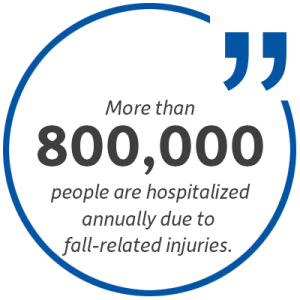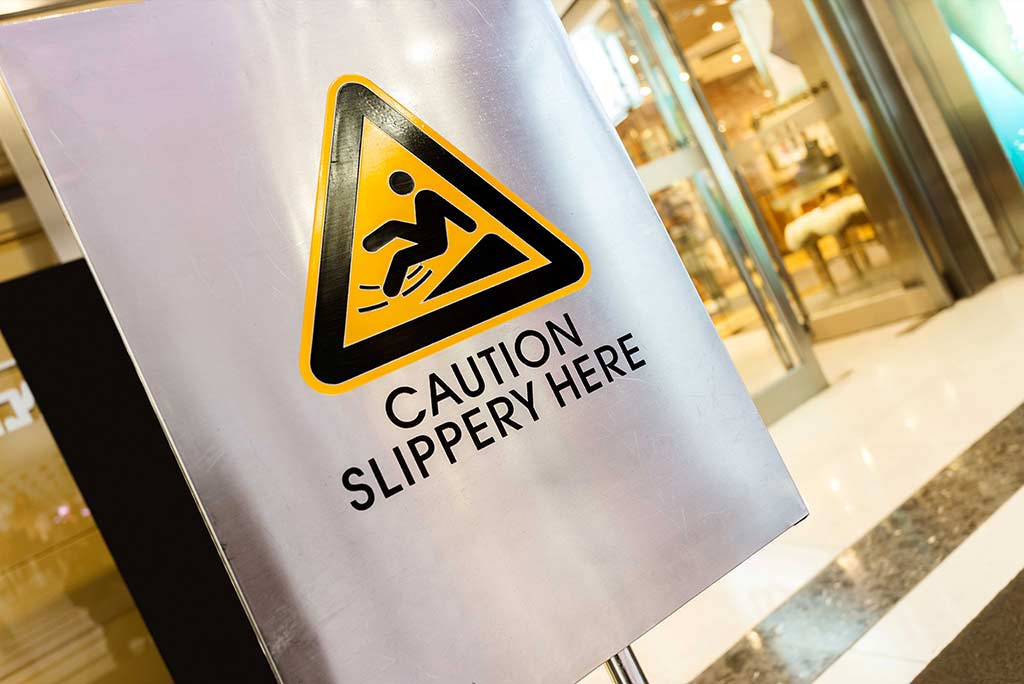
According to the CDC, more than 800,000 people are hospitalized annually due to fall-related injuries, which is why it’s important to know what to do after a slip and fall accident. Of those sustained injuries, traumatic brain injuries are the most common.
Not only can slip and fall injuries be traumatic and life-threatening, but they can also be costly to treat. On average, the yearly cost for treatment of fall injuries is in the billions — in 2015, it was reported to be $50 billion.
Fortunately, you can seek compensation for the treatment of slip and fall injuries. However, to win your case and recover the compensation you deserve, you must prove that another party was liable for your slip and fall accident. This is why the steps you take after a slip and fall are so important, as they can play a role in your case and the settlement you are awarded.
At Crossen Law Firm, we have years of experience handling slip and fall cases in Indianapolis and the surrounding areas. If you need help proving fault and recovering compensation for your injuries, we can help.
How Do Slip and Fall Accidents Happen?
Slip and fall accidents can happen in any number of situations. However, they are most often a matter of premises liability, meaning they usually occur due to negligent property owners.
Property owners are legally responsible for maintaining a safe premise. This means ensuring their property is free of hazards that could cause someone harm. If a known hazard causes someone to slip and fall and injure themselves, the property owner can then be held liable and financially responsible for the damages suffered, such as the medical expenses to treat the victim’s injury.
Examples of situations and places where slip and fall accidents can occur due to negligent property owners include:
- Uneven or slippery surfaces at amusement parks
- Spilled liquids or foods in grocery stores
- Recently mopped or waxed floors in retail stores
- Slippery surfaces in restaurants
- Poor lighting or lack of handrails in stairwells
- Broken or uneven flooring
- Uncleared snow or ice on sidewalks or pathways owned by businesses
- Cluttered floors in stores
- Loose carpeting or rugs
- Loose wires
Slip and Fall Injury Treatment
Again, the annual cost of slip and fall injury treatments is typically billions of dollars. And while health insurance might cover some of those expenses, it certainly doesn’t cover it all. It also depends on whether or not the victim has insurance or what kind of coverage their plan provides.
Of course, some slip and fall accidents might only result in minor injuries, such as scrapes, bumps, and bruises. However, it is common for slip and fall accidents to result in severe injuries, especially if the victim falls on a hard surface or from a great height.
For example, if someone slips and falls on carpeting, they might walk away with a minor bruise. But if someone slips and falls down a flight of stairs or falls on a hard surface and hits their head, the injury will likely be much more severe. And the treatment for those severe injuries will be more extensive and costly.
Traumatic brain injuries, for instance, are common injuries sustained in slip and fall accidents. And depending on how extensive the brain injury is, it could cost thousands of dollars to treat and could even leave the victim permanently impaired or disabled.
In the worst cases, slip and fall accidents can result in death, leaving the family members and loved ones to pay for the medical bills.
What to Do After A Slip and Fall Accident
To ensure you win your slip and fall case, it’s important to take certain measures. Below are the steps to take after a slip and fall accident:
- Get medical attention: After a slip and fall, your well-being should be your number one priority. If you are badly injured, seek medical attention as soon as possible. Documents proving you were treated for injuries will also serve as evidence to help you win your case, so make sure you keep copies of all your medical bills and any other documents given to you by the doctor.
- Report the accident: Many people often ask how to report a slip and fall when these things happen. Depending on where you are, you will want to find someone in charge and ensure they file an official report of the incident. Do not simply rely on just anyone to report it. Make sure someone in charge is directly notified. If no report is filed, the business or property owner could try to claim that there is no evidence of such an incident ever occurring.
- Gather evidence: To back up your claim, make sure you gather evidence at the scene of the accident if you can. This includes taking photos of where you slipped and fell and what caused you to slip and fall. You can also take videos with your phone. Witnesses who saw what happened can also be used as evidence, so make sure you get their contact information so they can be called on to give a statement if necessary. You can also ask for copies of surveillance footage that might have captured the accident. If you cannot obtain this on your own, a lawyer can help.
- Avoid giving statements: After the accident, you must avoid saying anything that could be used against you. For example, you don’t ever want to say things like “I’m fine” if someone asks if you’re okay. You also don’t want to admit that the slip and fall was your fault. Be polite, but try to avoid saying things that could be used to deny your claim, especially if you are being asked questions by the property or business owner’s insurance company.
- Consult an attorney: The smartest thing to do after a slip and fall accident is to contact a lawyer. They will be able to guide you through the process, help you avoid saying anything that could be used against you, and help you gather evidence to build a strong case.
What to Do After a Slip and Fall Accident to Recover Compensation
Though property owners are legally responsible for maintaining a safe premise, this does not mean they can automatically be blamed for every accident on their property. For example, if you are shopping and someone spills a drink, and you immediately slipped and fell on the liquid before the owner could be notified, then you cannot reasonably expect that owner to be held liable.
Thus, to win a slip and fall case, you must be able to prove that the property owner knew about the hazard and failed to address it in a reasonable amount of time. And to do this, you will likely need to work with a lawyer.
When you file your claim, you will have to provide evidence that proves the following elements if you intend to recover compensation:
- The property owner owed you a duty of care
- A dangerous condition existed on the property
- The property owner knew about or should have known about the dangerous condition
- The property owner breached their duty of care by failing to address this dangerous condition in a reasonable amount of time
- The dangerous condition was the direct cause of your slip and fall accident
- You suffered damages (injuries) as a result of the accident
Proving the above elements is not easy. There are often arguments that come up, such as the owner trying to claim they didn’t know about the hazard. So you will need to work with a lawyer to gather evidence and build a strong argument that the property owner cannot refute.
How an Indiana Slip and Fall Attorney Can Help
If you or a loved one were injured on someone’s property, you have a right to file a claim against them to pursue compensation for your injury and other damages. Money awarded for damages can help cover medical expenses, loss of wages if you miss work, and pain and suffering. However, proving fault in a premises liability case can be difficult.
When you’ve been injured in an accident, the team at Crossen Law Firm can help. Our team has over 20 years of experience to help you win your case and receive the full compensation that you deserve.
Contact us today or give us a call for a free consultation at (317) 401-8626.

 317-401-8626
317-401-8626 
.jpg)